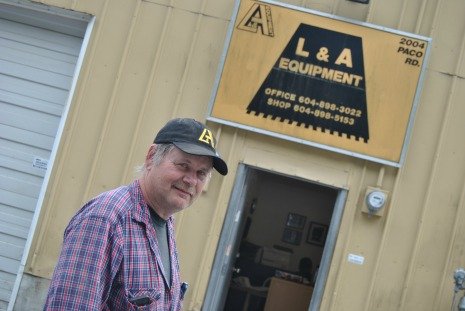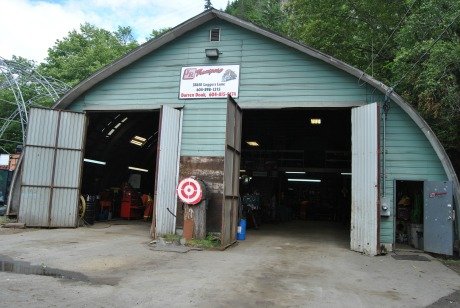
Photo: Gagandeep Ghuman
By Gagandeep Ghuman
Published: Aug. 4, 2014
Kelly Jian’s greased hands have fixed logging trucks, cranes and CATs every day for the last 20 years. But there is something even his rugged hands can’t fix: Zoning.
Jian owns a heavy equipment repair shop on Paco Road, a short strip of land that is a patchwork of unkempt buildings. Even though every shop there does some kind of industrial work, the district changed the zoning from industrial to residential in the 90s.
The existing industrial businesses were grandfathered in, but they were told they aren’t allowed to rebuild in a way that would change their foot print. That rezoning from industrial to residential has trapped people like Kelly Jian in an in-between world.
It’s also hurting business: Jian wants to expand his business and hire more people, but can’t.
On a recent afternoon, he looked longingly at the empty space and imagines the possibilities: “If I had more space that I could cover, I’d hire more people and grow my business.”
But he isn’t allowed to change the size or the shape of the building because the district’s vision is to see houses there in the long run.
“This is so frustrating,” says Jian.
He isn’t the only one feeling the sting. Practically, every shop on Paco Road is rickety and needs TLC.
Rick Schnurr owns L& A Equipment on Paco Road, two shops that he bought in the 60s. He takes some comfort in the fact that he is grandfathered in, but he finds the uncertainty discomfiting.
He doesn’t see any residential developer eager to buy all shops to build homes. Finding an appropriate space in the business park is a challenge, and taxes are high there.
“There is much space for us to go, and there is uncertainty on this space,” he said.
Jian too plans to go to the business park, but the taxes are high and he would have to sell the existing shop on Paco Road.
He wants the district to revert the zoning back to industrial and allow them to rebuild.
“I wouldn’t mind paying some extra taxes for some certainty,” he says.
District planner Sabina Foofat said Paco Road had been industrial for a long time, but was rezoned to Multi-Unit Residential which makes any industrial uses pre-existing, non-conforming use.
“A pre-existing non-conforming use can continue to operate, but it can’t expand,” she said.
Foofat said any major renovations or improvements to the industrial buildings on Paco Road would have to comply with multi-family requirements.
“For most industrial buildings, complying with multi-unit family guidelines is not very practical,” she said.
If an operation wants to grow, it must find suitably zoned parcel and if a building remains vacant for over six months, it can’t continue on its present use, she added.

Photo: Gagandeep Ghuman
The district has allowed some structural improvements, but these are not expansions. A similar problem plagues Darren Doak, whose property on Loggers Lane is zoned industrial but has been designated residential in the OCP.
In the last five years, consecutive councils have rezoned or re-designated over 178 acres of industrial, tourist-commercial, or other employment lands to housing or residential.
The most symbolic example of this transformation is the Waterfront Landing project, a 53-acre former mill site that was rezoned for 1500 condos.
It’s now a failed residential project, with a private bank owing close to $30 million from the proponents. Narinder Nagra, who represents the bank, Sprott Resource Lending Corp, said the bank doesn’t have a buyer yet.
In a brief phone interview with the Reporter, Nagra said that perhaps the best use for that land might be industrial.
Historian Eric Andersen says Waterfront Landing should have never been zoned residential.
With access by truck, rail, and water, the site can contribute more to the local economy.
Industrial lands like the Waterfront Landing is one of the sites that vapourized in the real estate euphoria of Olympics, says Coun. Ted Prior.
“We got carried away,” Prior said.
Andersen, who conducted research on the issue, said the district needs to be vigilant in protecting industrial land from conversion to commercial or residential uses.


Rick says
Maybe its time for a new planning dept that works with the wishes of the taxpayer and not their personal agenda.
Gailforce says
It’s not reasonable that these people bought their properties with industrial zoning and then it gets changed to residential midstream. An individual can’t sell and move on. No one is going to buy one property for residential when it’s amongst all the industrial, so, everyone there is held hostage until some developer comes along and buys the whole street. Then they won’t get appropriate value for the business part, they will only get lot value.
Paco Rd. makes sense as industrial space and would make more sense if people could improve their properties and expand their necessary businesses.